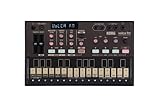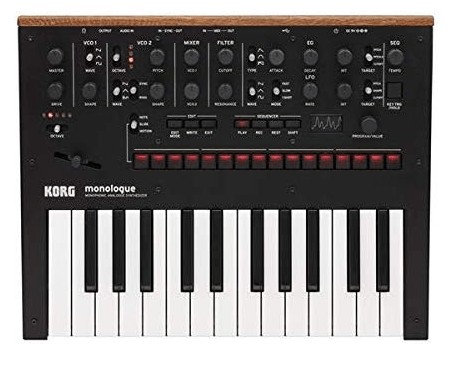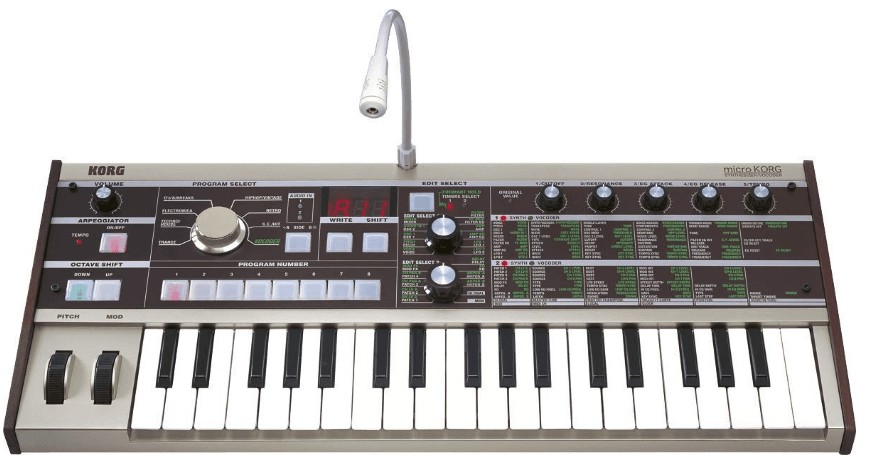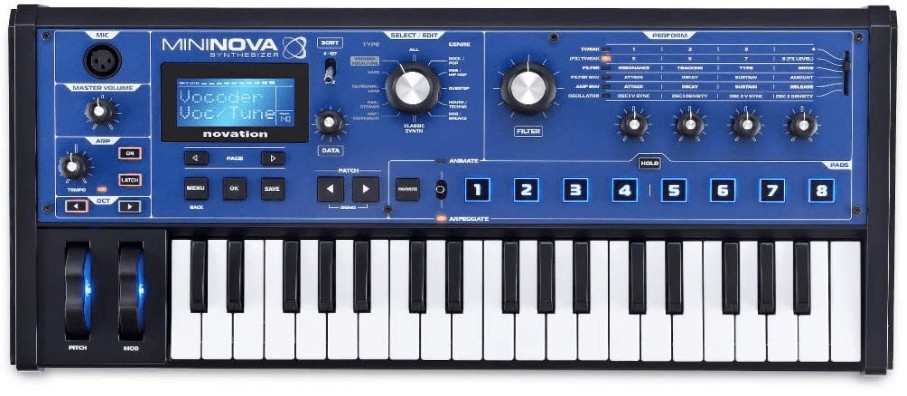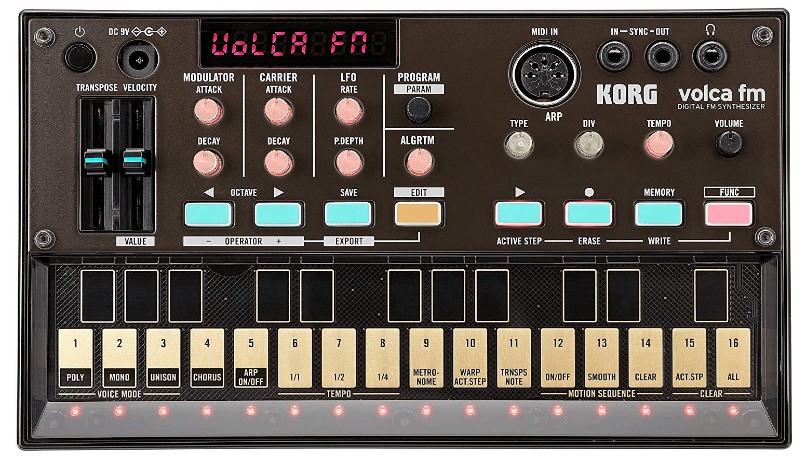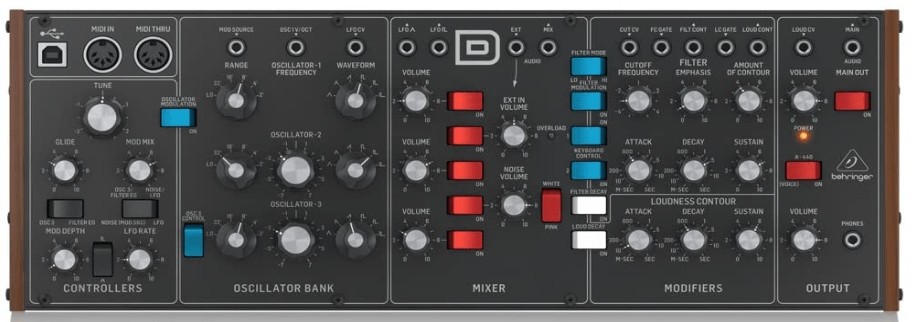The twentieth century introduced the use of the synthesizer as an alternative musical instrument for producing sounds that were similar to those produced by acoustic instruments like the violin. For many years, people only relied on acoustic musical instruments for sound production and music creation.
With the introduction of the synthesizer creating new tunes that either mimicked those produced by acoustic instruments or had minimal variations became easy and common in the music industry. The synthesizer is still a common musical instrument today and is part of most modern studios that record music. Let’s see what is the best synthesizer and the buying guide to help you to decide.
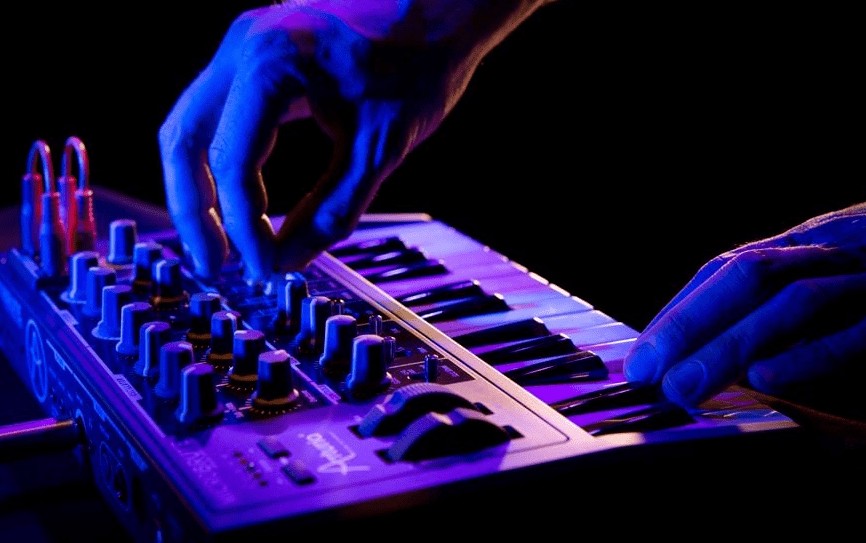
9 Best Synthesizers On the Market
How to Choose the Best Synthesizer?
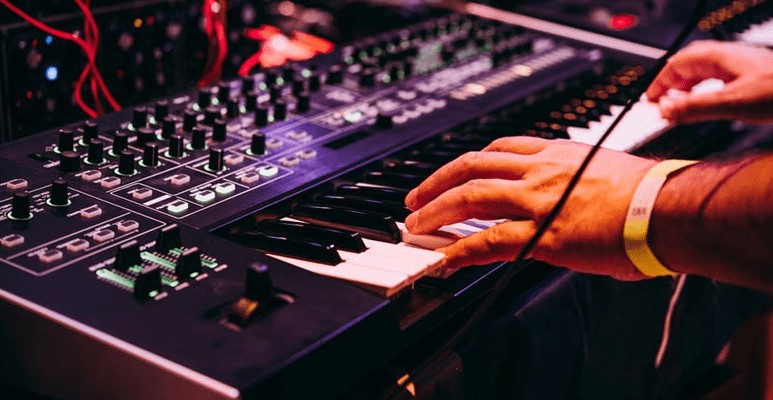
-
Analog or Digital
The first thing you should consider is whether you want a digital or analog synthesizer. Analog synthesizers have been associated with offering users big basses, lovely padding, and searing strings. Digital synthesizers have been linked to offering you a wide range of sounds, as most digital music synthesizers are good at mimicking sounds.
-
Features
You should consider the features of the synthesizer and the material used to make them. If you are going for an analog synthesizer, check how easy it is to turn the knobs, its power use, control, and the versatility of the sounds produced by the synthesizer. This will help you determine whether you want to buy the synthesizer or look for other alternatives.
-
Modular or All-in-One
Consider whether you want to have a synthesizer that has presents or one that will allow you to create your own unique tunes. Although the all-in-one might seem expensive at first, it will most likely save you a considerable amount of money. Opting for a modular route will enable you to combine any component of the musical instruments that you wish.
-
Warranty
A synthesizer that comes with a long-term warranty suggests that the manufacturers had faith in the capabilities of their instrument and generally do not expect it to breakdown after a few uses.
Check the provisions of the warrant to ensure that if it breaks down due to normal use, the manufacturer can either repair it or replace it with a new one.
-
New or Second Hand
If you do not have much money to spend on a synthesizer, getting a budget synthesizer can significantly reduce your budget especially if you are purchasing the synthesizer from someone you trust. On the other hand, if you do not have a close relationship with the seller, you might end up getting a synthesizer that has multiple faults.
Buying a new synthesizer might be slightly costly but it will offer you benefits such as a warranty, accessories like new power cords that might come with the synthesizer, and fully functional knobs or keys.
-
Ease of Using the Synthesizer
If you are a beginner and you are still learning how to use a synthesizer, ensure that you pick one that is easy to use and does not have numerous complicated buttons that will annoy you. You can move to a more complicated version after learning how to use the simpler one.
Alternatively, if you are interested in becoming a music producer you can select one that looks similar to those used by renowned music producers and learn how to use it slowly.
-
Portability
If you are a mobile musician, you might want to select a synthesizer that can easily it in your bags or that you can easily move around with when traveling. This will ensure that you always have your synthesizer with you.
-
Sound Quality
When selecting your synthesizer, consider the differences in the sound quality produced by the synthesizers you come across. In most cases, a fairly cheap analog synthesizer may not produce the best quality of sound when compared to an expensive version with added features or upgrades.
9 Best Synthesizer Reviews
1. Best Value -Roland JUNO-DS88 88 Key Synthesizer
Brilliant features
- Portable and lightweight
- Preset patches
- Gig-friendly
- Easy sound manipulation and editing
- Free downloadable sounds
- Eight phrase pads
Watch out for
- No real sequencing
The life of a band does not seem to be simple and straightforward, as you are made to believe. For instance, on a typical day, you will be required to rehearse, record, and even give a live performance. Each situation requires a unique approach to music.
Fortunately, the Roland JUNO-DS88 88 Key Synthesizer is designed to set you free. No matter your music leads, this 88-note synth is bound to follow, with the smart operation, compact dimensions, and choice of onboard sounds for anything from street performance to work.
You will find the Roland JUNO-DS88 88 Key Synthesizer to play like a traditional piano, thanks to 88 weighted action keys. Also, the keyboard feels good with your fingers and inspires you to come up with amazing songs and even perform tighter shows. Thus, with this instrument, you are bound to take your band to another level.
As a musician, you need to own the stage when playing. When it is the right time to play your music, you may be let down by a cumbersome synth that makes you feel asleep. The good thing about JUNO-DS88 is that it offers compact size, speedy setup, and practical weight. Thus, it will take your hectic schedules and help you make your gig memorable.
2. Best 25 Key -Korg Monolog Synthesizer
Brilliant features
- 16 step buttons for easy capture and editing
- Built-in oscilloscope
- Highly programmable
- Extremely portable
- Battery-powered
- Accessible for beginners
Watch out for
- The keys are smaller than standard keys
The Korg Monolog Synthesizer is a fully programmable monophonic synthesizer that creates a unique voice. Its sleek layout, high-quality construction, and knob-per-function make this one of the best-selling monologues. Thus, this offers unique synth for any given type of musician. It features new sound sculpting and voicing abilities.
This monolog has a new filter, LFO, drive, and modulation that generates sharp leads and powerful basses to create mono sounds and even showcase its voice design. Also, the unit has been expanded to provide more complex and intuitive editing. You also have a lineup that provides you with a particular choice of color you want.
You should note that this unit features a monophonic analog synthesizer circuit system and fully programmable with over 100 preset locations. Another feature you will like about the Korg Monolog Synthesizer is its 16-step sequencer. In fact, this sequencer has been improved to provide complex rhythms that are easy to edit, see, and capture.
With micro-tuning, you have the freedom to create the scales you want. In this modern era, music is no longer restrained to the temperament scales. Unfortunately, there are few machines available that support micro tuning. This is one of those that support micro-tuning.
3. Best 37 Key -Korg Analog Modeling Synthesizer
Brilliant features
- Six types of arpeggio patterns
- Easy to carry and set up
- Four filter modes
- Built-in speaker
- Easy to use
- Can be used as a MIDI controller
Watch out for
- Too many sounds that are similar
The Korg Analog Modeling Synthesizer provides the much-needed avenue for creating music. It combines battery power, mini-keys, phenomenal sound, and intuitive interface. You can use this synthesizer for any given type of music.
It features the selectable-step arpeggiator and built-in vocoder that adds a new dimension to recording and performing without the need for mastering new technologies. Any given sound can be processed by this synthesizer’s filter.
With the dedicated knobs, the miroKorg offers you an opportunity to explore all parameters and creativity that comes with sound creation. The compact design makes it easy to set up and carry. Also, there is no tough structure, as all parameters are on the panel to offer easy access to any given function.
The unit has over six types of arpeggio patterns that are built-in. In fact, you can adjust the resolution and length of arpeggiated notes. Also, you can switch the steps to create cool patterns.
You can easily connect your mic to this synthesizer. In this way, you can use it as a vocoder, giving the impression that it is singing or speaking.
With the wooden side panels and the retro-feeling design, the miroKorg seems to offer an attractive visual appearance in your home studio.
4. Best 76 Key -Yamaha MODX7 Synthesizer
Brilliant features
- Dual synth engines
- Professional functions and features
- Great live performance
- 4-Part seamless sound switching
- 8-operator FM architecture
- Inspiring sounds with 192-note polyphony
- Portable for carrying to anywhere you want
Watch out for
- Not very ideal for composing tunes
The Yamaha MODX7 Synthesizer is designed to take your creativity to another level. With this synthesizer, you have the opportunity to stand out and take control of the crowd. Ideally, this is a lightweight and compact synthesizer meant for creating inspiring music. Its engine allows creating unique sounds as demanded by artists.
This synthesizer features an advanced wave memory that provides more than playback. In fact, each of the eight fully-programmable synthesizers has a filter, filter envelope generators, and amplitude.
You will also like the FM-X frequency modulation that makes it capable of making classic 70s or modern urban music. Ideally, this unit allows for a wide range of sound design options, thanks to its power, fidelity, and dynamic range.
With seamless sound switching, you can change the performances you want without cut-off. Also, its super knob offers you the opportunity to control 128 parameters in any given performance simultaneously. You should note that the motion sequences are completely customized and can be assigned to any given synthesizer parameter.
5. Best Powerful -Yamaha Montage8 Synthesizer
Brilliant features
- Quality sound
- Dual iconic Sound Engines
- Super Knob for easy controlling
- Easy to manipulate and change in real-time
- Touch screen
- Eight rotary encoders and faders
Watch out for
- A bit heavy for carrying around
The Yamaha Montage8 sets the milestone when it comes to massive sound creation, sophisticated dynamic control, and streamlined workflow. All these are combined with a powerful keyboard that inspires your creativity.
You will like the fact that Yamaha Montage8 adds another level of expression with its engine that allows for a wide range of methods of interacting with the channel. This is aimed at helping you find a unique sound and spur your creativity.
Like other high-end synthesizers on the market, the unit features a super knob. This allows you to create amazing sounds and control many parameters that may result in anything that you can think of. For instance, you can easily change the listening position to the back seat of a concert hall. The motion sequences are synchronized, and you can assign them to any synthesizer. This is one of the methods of programming sound.
You will also like its Envelope Follower that helps convert the audio into the source for adequate control of the synthesizer parameter. For instance, the drum loop can easily drive the effects of vocal recording and cool rhythms.
Another vital feature of Yamaha Montage8 is its touchscreen. This allows you to change and select different parameters directly. The live sets allow you to organize all your performances without the need for renaming or changing the order. That makes it ideal for creating their own performances and playing gigs.
6. Best Mini – Novation MiniNova Analog Synthesizer
Brilliant features
- Balance of controls
- Eight animate buttons
- 256 onboard sounds
- Backlit buttons
- Large space for saving sounds
- Synth capabilities
Watch out for
- Keys are small
The Novation MiniNova Analog Synthesizer is a compact and lightweight, yet it has incredible performance controls. You should not be fooled by its size; it has a powerful sound engine that means you can create and edit massive bass sounds.
You will like the fact that this unit comes with editing software. As you know, editing sounds can be quite overwhelming. The editor works with a plug-in within the DAWs or your music software. In fact, the software makes the process easier for you than using hardware.
The unit has a powerful sound engine, and there are over 14 conventional waveforms you can choose from. MiniNova adds up to 5 different effects of sound that include reverb, delay, compressor, chorus/phase, and distortion.
Its perform section allows you to access the effects and synth engines you can switch between 6 positions and even assign four knobs. That means you have access to the 24 sound-bending parameters.
You have the freedom to choose your favorite sound. You should note that this synthesizer has over 256 onboard sounds. Also, it has adequate space to save up to 128 of your sounds. In fact, you can search for sounds by choosing a style of music you make and the type of sound you want.
With eight animate buttons, you can twist and warp the sounds in real-time alongside the dedicated filter knob. In addition, it has four editing knobs and modulation wheels and oversized pitch.
7. Yamaha MX49 Music Production Synthesizer
Brilliant features
- Lightweight and compact
- Easy to use
- Over 1000 MOTIF Voices
- Powerful music production software
- VCM effects
- High performance
- Ideal for beginner musicians
Watch out for
- The LED display is not great
- Not for live performances
The Yamaha MX49 Music Production Synthesizer is ideal for studio and stage. This synthesizer has over 1000 voices from Motif series plus iOS and deep computer integration in a lightweight and compact keyboard.
This synthesizer is designed to have a powerful sonic palette into sleek packages that can fit your on-the-go lifestyle. Other than being a synthesizer, it bridges the gap between software and hardware. It also integrates hardware reliability plus controller flexibility to offer you the best of both worlds at the groundbreaking level of affordability.
You will find this synthesizer quite easy to use. For instance, it has a plug and plays a USB that is compatible with PC, Mac, and iOS. You only need to plug in and play. This means that your synthesizer becomes your MIDI and audio interface for the rest of the music studio.
You can combine two Voices to play on the keyboard using dedicated Layer and Split buttons with an intelligent arpeggiator and a drum track to create amazing performances.
This synthesizer has durable and solid buttons to control internal sounds, VST instruments, and DAW parameters.
8. Best Digital Synthesizer -Korg VOLCA FM Synthesizer
Brilliant features
- 16-step sequencer
- Powerful and portable
- Capability to import DX7 patches
- Sequencer features
- Easy operation for sound editing
- Polyphonic and tweakable
Watch out for
- The keybed is small
- Cannot store saved patterns
The Korg VOLCA FM Synthesizer has shed some light on the classic technologies as it links classic sound engines, like early samplers and groove machines. Actually, this is the right time to get an FM sound engine.
The synthesizer offers a sync connector that can be connected to groove machines. In fact, you can connect it to volca series unit. When two volca units are connected, you can easily clone sound programs and data.
This synthesizer makes it easy for you to edit with super-easy edit knobs. You will find the knob movements mapped to parameters to make it easier to understand the sound changes. Also, there is a parameter list guide to help you.
9. Behringer MODELD Synthesizer
Brilliant features
- Small but with great hardware
- Multiple units
- Responds to MIDI modulation
- 5 variable oscillator shapes
Watch out for
- Requires power supply
The Behringer MODELD Synthesizer is innovatively designed to allow you to shape the future and embrace the past. In fact, great care has been taken when it comes to designing this model with matched transistors and film resistors. With this unit, you can create sounds of your imagination in your own right.
The unit has a VCO triple play that offers an incredible range of five waveforms for producing perfect sound. This amazing flexibility provides you with the tools you want to be at your creative, at best.
With this synthesizer, you have complete control of onboard modulators. Also, a range of switches is offered for choosing between square or triangle wave oscillation. In fact, the tuning knob is important for adjusting the frequency.
Although it is a monophonic instrument, the chain function allows you to combine different synthesizers for 16-voice polyphony that lets you combine the synthesizers to offer improved stability and reliability.
With its semi-modular design, you only need to connect your favorite computer or keyboard via MIDI over USB or DIN and begin to explore the world of analog music synthesis.
What is a Synthesizer?
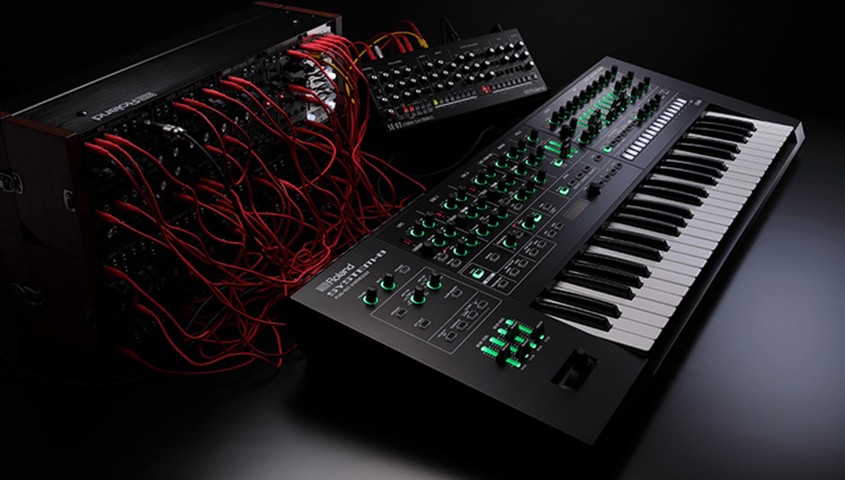
Synthesizer is an electronic instrument that utilizes some form of analog or digital processing to mimic the sound of different musical instruments like an acoustic piano and a violin or create brand new sounds. They are often used to mimic the sounds of traditional instruments and artificially reproduce the sounds.
While they are effective in mimicking acoustic instruments, they usually do not generate the exact sound as that produced by the acoustic instrument. For instance, the physical activity, which makes an acoustic piano produce its sound, the striking of the individual strings with a felted hammer, will not be felt when using the synthesizer.
FAQs about the Best Synthesizer

1. How does synthesizer work?
The mechanism of action of a synthesizer relies on an oscillator, which can either be a digital or an analog voltage-controlled oscillator. Music produces sounds through these oscillators by either stalking together multiple sine waves, square waves or sawtooth waves or by using a series to filters to remove frequencies from the sound waves.
The addition process is referred to as assistive synthesis while the latter is referred to as subtractive synthesis. The filter is set to remove specific frequencies of sound along the audio spectrum. The filters block one set of frequencies while allowing the rest of the frequencies to pass through and create the tune that you desire.
The filter can work almost in a similar way as an equalizer. For instance, a high-pass filter will high frequencies to pass through while at the same time blocking out the high frequencies. The tune produced will be similar to the original tune but it will lack the low frequencies.
2. What’s the difference?
-
Analogue Synthesizer and Digital Synthesizer
An analog synthesizer uses a voltage-controlled oscillator, which is based on electronic circuits to produce sounds while a digital synthesizer uses digital processing to promote the production of sounds. As such, a digital synthesizer is technically a computer.
Digital signal processing entails taking an actual recording of people’s voices, a piano playing, or other musical instruments and mathematically processing and manipulating them to produce a sound that is almost similar to the original. As such, the digital synthesizer uses a series of algorithms to produce music.
An analog synthesizer is closely related to a traditional instrument like a guitar or a piano than a digital synthesizer. You can easily play the same note on a piano and obtain variations of sounds due to the polyphony feature that comes with most pianos.
Pressing the keys of the piano harder or softer will offer you different sounds, which were heard in the end product or the song being produced. This interaction of physical elements of the musical element is what makes an analog synthesizer different from a digital synthesizer.
In a digital synthesizer, although you might try to recreate the same sound, the end product will not sound the same as that produced by the analog synthesizer.
-
Synthesizer and Keyboard
A keyboard can be described as a musical instrument that resembles an acoustic piano but is smaller in size and does not produce the exact sound like an acoustic piano. On the other hand, a synthesizer can be described as musical equipment that creates sounds by altering the sounds of acoustic musical instruments programmed into it to form new and unique sounds.
When you press a key on a keyboard you complete an electric circuit that leads to the production of the tone of that key. Synthesizers do not produce their own unique sounds based on similar keys as those found on keyboards.
Keyboards are hardware products that can be bought and used in the same manner as an acoustic piano. They offer a wide range of notes depending on the number of keys that they come with. Synthesizers come as either hardware synthesizers or software programs that perform the same function as the hardware synthesizer but offer slightly different sound qualities.
Another difference between keyboard and synthesizers is their size. Keyboards are created for musicians who enjoy playing the piano but also prefer the ability to move around with their musical instruments. Synthesizers are quite big in size and are not as easy to move around as keyboards.
-
MIDI Keyboard and Synthesizer
A MIDI controller is a hardware instrument that is commonly used in composing electronic sounds. A MIDI looks pretty much like a digital or standard keyboard that would have an additional range of knobs, sliders, pads, and buttons for regulating the sound produced.
MIDI controllers are incapable of producing their own music or sound. They work with a system of and transmit their data to other devices that are compatible with them. The data transmitted by a MIDI keyboard can include information such as how hard the key was pressed, the duration you held the key before moving to a different note, or the softness of your hold on the key.
When compared to a MIDI keyboard, synthesizers can produce their own sounds, which are unique from those produced by other equipment, despite being renowned for mimicking the sounds of other musical instruments. It is important to note that although they can create new sounds, they do not create anything new other than what had initially been programmed into their system during the manufacturing process. They do not rely on external interface or software programs to create musical sounds.
Unlike MIDI keyboards, which may or may not come with their own in-built speakers, synthesizers usually come with their internal speakers and are usually larder than MIDI keyboards.
3. Do I Need Speakers for a Synthesizer?
Most synthesizers do not have speakers, which means you might need to look for suitable speakers that are compatible with them. Synthesizers usually do not have speakers because they of the additional weight. Besides while using synthesizers most musicians prefer using external speakers that will offer then better sound quality as opposed to relying on those that come with the synthesizer.
If you are planning to get speakers, look for external speakers that will work well with the rest of your system as opposed to looking for a synthesizer that comes with speakers. This is also because while you will be recording the music in a live room, it would be easier to let the sound from the speakers to go directly into the mix through a pre-amp.
4. Do I Need to Know the Piano to Play a Synthesizer?
You do not necessarily need to know how to play the piano to be able to use the synthesizer. While being able to play the piano well would be an added advantage if you were planning to use a synthesizer, not knowing how to play the piano will not limit you from using a synthesizer.
Some of the additional benefits that you could get from being able to play the piano include the ability to notice the differences between notes and the ability to control the frequencies better to produce better sound. A piano will also help you understand how placing different pressures on the keys produces different sounds.
Conclusion
If you are interested in learning how to play different instruments or music production you should at least know, what a synthesizer is and how it works. Today you will find most music producers with both a software and hardware version of a synthesizer.
Some music producers have software programs that emulate plugins of some of the well-known and most famous hardware synthesizers that were created more than ten years ago. Such synthesizers had managed to capture the classic sounds of acoustic instruments well.
Finding these software programs can significantly reduce the cost you would incur if you were to purchase an actual hardware synthesizer. Consider the reviewed synthesizers and make your choice.








